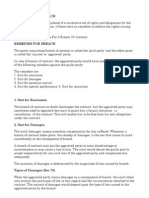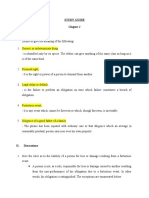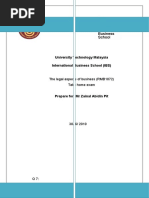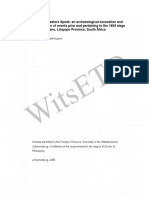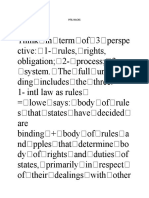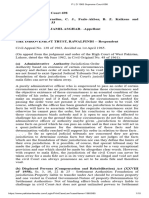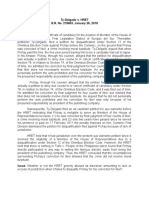Chapter 1D. Punitive Damages. 1D-1. Purpose of Punitive Damages
Chapter 1D. Punitive Damages. 1D-1. Purpose of Punitive Damages
Uploaded by
Jacen BondsCopyright:
Available Formats
Chapter 1D. Punitive Damages. 1D-1. Purpose of Punitive Damages
Chapter 1D. Punitive Damages. 1D-1. Purpose of Punitive Damages
Uploaded by
Jacen BondsOriginal Title
Copyright
Available Formats
Share this document
Did you find this document useful?
Is this content inappropriate?
Copyright:
Available Formats
Chapter 1D. Punitive Damages. 1D-1. Purpose of Punitive Damages
Chapter 1D. Punitive Damages. 1D-1. Purpose of Punitive Damages
Uploaded by
Jacen BondsCopyright:
Available Formats
Chapter 1D.
Punitive Damages.
§ 1D-1. Purpose of punitive damages.
Punitive damages may be awarded, in an appropriate case and subject to the provisions of this
Chapter, to punish a defendant for egregiously wrongful acts and to deter the defendant and others
from committing similar wrongful acts. (1995, c. 514, s. 1.)
§ 1D-5. Definitions.
As used in this Chapter:
(1) "Claimant" means a party, including a plaintiff, counterclaimant,
cross-claimant, or third-party plaintiff, seeking recovery of punitive damages.
In a claim for relief in which a party seeks recovery of punitive damages related
to injury to another person, damage to the property of another person, death of
another person, or other harm to another person, "claimant" includes any party
seeking recovery of punitive damages.
(2) "Compensatory damages" includes nominal damages.
(3) "Defendant" means a party, including a counterdefendant, cross-defendant, or
third-party defendant, from whom a claimant seeks relief with respect to
punitive damages.
(4) "Fraud" does not include constructive fraud unless an element of intent is
present.
(5) "Malice" means a sense of personal ill will toward the claimant that activated
or incited the defendant to perform the act or undertake the conduct that resulted
in harm to the claimant.
(6) "Punitive damages" means extracompensatory damages awarded for the
purposes set forth in G.S. 1D-1.
(7) "Willful or wanton conduct" means the conscious and intentional disregard of
and indifference to the rights and safety of others, which the defendant knows
or should know is reasonably likely to result in injury, damage, or other harm.
"Willful or wanton conduct" means more than gross negligence. (1995, c. 514,
s. 1.)
§ 1D-10. Scope of the Chapter.
This Chapter applies to every claim for punitive damages, regardless of whether the claim for
relief is based on a statutory or a common-law right of action or based in equity. In an action
subject to this Chapter, in whole or in part, the provisions of this Chapter prevail over any other
law to the contrary. (1995, c. 514, s. 1.)
§ 1D-15. Standards for recovery of punitive damages.
(a) Punitive damages may be awarded only if the claimant proves that the defendant is
liable for compensatory damages and that one of the following aggravating factors was present
and was related to the injury for which compensatory damages were awarded:
(1) Fraud.
(2) Malice.
NC General Statutes - Chapter 1D 1
(3) Willful or wanton conduct.
(b) The claimant must prove the existence of an aggravating factor by clear and convincing
evidence.
(c) Punitive damages shall not be awarded against a person solely on the basis of vicarious
liability for the acts or omissions of another. Punitive damages may be awarded against a person
only if that person participated in the conduct constituting the aggravating factor giving rise to the
punitive damages, or if, in the case of a corporation, the officers, directors, or managers of the
corporation participated in or condoned the conduct constituting the aggravating factor giving rise
to punitive damages.
(d) Punitive damages shall not be awarded against a person solely for breach of contract.
(1995, c. 514, s. 1.)
§ 1D-20. Election of extracompensatory remedies.
A claimant must elect, prior to judgment, between punitive damages and any other remedy
pursuant to another statute that provides for multiple damages. (1995, c. 514, s. 1.)
§ 1D-25. Limitation of amount of recovery.
(a) In all actions seeking an award of punitive damages, the trier of fact shall determine
the amount of punitive damages separately from the amount of compensation for all other
damages.
(b) Punitive damages awarded against a defendant shall not exceed three times the amount
of compensatory damages or two hundred fifty thousand dollars ($250,000), whichever is greater.
If a trier of fact returns a verdict for punitive damages in excess of the maximum amount specified
under this subsection, the trial court shall reduce the award and enter judgment for punitive
damages in the maximum amount.
(c) The provisions of subsection (b) of this section shall not be made known to the trier of
fact through any means, including voir dire, the introduction into evidence, argument, or
instructions to the jury. (1995, c. 514, s. 1.)
§ 1D-26. Driving while impaired; exemption from cap.
G.S. 1D-25(b) shall not apply to a claim for punitive damages for injury or harm arising from
a defendant's operation of a motor vehicle if the actions of the defendant in operating the motor
vehicle would give rise to an offense of driving while impaired under G.S. 20-138.1, 20-138.2, or
20-138.5. (1995, c. 514, s. 1.)
§ 1D-30. Bifurcated trial.
Upon the motion of a defendant, the issues of liability for compensatory damages and the
amount of compensatory damages, if any, shall be tried separately from the issues of liability for
punitive damages and the amount of punitive damages, if any. Evidence relating solely to punitive
damages shall not be admissible until the trier of fact has determined that the defendant is liable
for compensatory damages and has determined the amount of compensatory damages. The same
trier of fact that tried the issues relating to compensatory damages shall try the issues relating to
punitive damages. (1995, c. 514, s. 1.)
NC General Statutes - Chapter 1D 2
§ 1D-35. Punitive damages awards.
In determining the amount of punitive damages, if any, to be awarded, the trier of fact:
(1) Shall consider the purposes of punitive damages set forth in G.S. 1D-1; and
(2) May consider only that evidence that relates to the following:
a. The reprehensibility of the defendant's motives and conduct.
b. The likelihood, at the relevant time, of serious harm.
c. The degree of the defendant's awareness of the probable consequences
of its conduct.
d. The duration of the defendant's conduct.
e. The actual damages suffered by the claimant.
f. Any concealment by the defendant of the facts or consequences of its
conduct.
g. The existence and frequency of any similar past conduct by the
defendant.
h. Whether the defendant profited from the conduct.
i. The defendant's ability to pay punitive damages, as evidenced by its
revenues or net worth. (1995, c. 514, s. 1.)
§ 1D-40. Jury instructions.
In a jury trial, the court shall instruct the jury with regard to subdivisions (1) and (2) of G.S.
1D-35. (1995, c. 514, s. 1.)
§ 1D-45. Frivolous or malicious actions; attorneys' fees.
The court shall award reasonable attorneys' fees, resulting from the defense against the punitive
damages claim, against a claimant who files a claim for punitive damages that the claimant knows
or should have known to be frivolous or malicious. The court shall award reasonable attorney fees
against a defendant who asserts a defense in a punitive damages claim that the defendant knows
or should have known to be frivolous or malicious. (1995, c. 514, s. 1.)
§ 1D-50. Judicial review of award.
When reviewing the evidence regarding a finding by the trier of fact concerning liability for
punitive damages in accordance with G.S. 1D-15(a), or regarding the amount of punitive damages
awarded, the trial court shall state in a written opinion its reasons for upholding or disturbing the
finding or award. In doing so, the court shall address with specificity the evidence, or lack thereof,
as it bears on the liability for or the amount of punitive damages, in light of the requirements of
this Chapter. (1995, c. 514, s. 1.)
NC General Statutes - Chapter 1D 3
You might also like
- Motion To Dismiss Sample 3Document13 pagesMotion To Dismiss Sample 3winprose89% (27)
- Certificate of Finality Request SampleDocument3 pagesCertificate of Finality Request SampleEmma Juta67% (3)
- Topic 8: Opinion Writing (Personal Injuries)Document10 pagesTopic 8: Opinion Writing (Personal Injuries)LEANDRA ABIGAIL DE COSTANo ratings yet
- Petition For Declaratory ReliefDocument5 pagesPetition For Declaratory ReliefLen Harris100% (2)
- Remedies Outline Very GoodDocument13 pagesRemedies Outline Very GoodMonte Bell100% (13)
- Law of Torts Ok2021Document23 pagesLaw of Torts Ok2021xorrNo ratings yet
- Remedies Available For Breach of ContractDocument6 pagesRemedies Available For Breach of Contractsyed_arshed15No ratings yet
- Remedies in breaching of contractDocument45 pagesRemedies in breaching of contractdaisyfavor35No ratings yet
- Damages (Apportionment and Assessment) Act (Chapter 8-06) - 0Document3 pagesDamages (Apportionment and Assessment) Act (Chapter 8-06) - 0trinityNo ratings yet
- First Integrated Bonding vs. HernandoDocument10 pagesFirst Integrated Bonding vs. HernandojieNo ratings yet
- PROVISIONAL REMEDIES SummaryDocument16 pagesPROVISIONAL REMEDIES Summaryjim peterick sisonNo ratings yet
- LAW GENERALDocument10 pagesLAW GENERALcarmela germanottaNo ratings yet
- TORTS ReviewerDocument37 pagesTORTS ReviewerAaliyah AndreaNo ratings yet
- 10 Essential Points On Civil LiabilityDocument4 pages10 Essential Points On Civil LiabilityYralli MendozaNo ratings yet
- (Torts) Elements and Requisites ReviewerDocument4 pages(Torts) Elements and Requisites ReviewerStradivariumNo ratings yet
- ALEC Periodic Payment of Judgments ActDocument4 pagesALEC Periodic Payment of Judgments ActALEC WatchNo ratings yet
- Alex Dy Comm Law Review OutlineDocument246 pagesAlex Dy Comm Law Review OutlineMelvin Banzon100% (1)
- Debtor Disposing of Collateral and Failing To Pay Public Notice, Public RecordDocument4 pagesDebtor Disposing of Collateral and Failing To Pay Public Notice, Public Recordin1or100% (1)
- United States Court of Appeals, Eleventh CircuitDocument6 pagesUnited States Court of Appeals, Eleventh CircuitScribd Government DocsNo ratings yet
- Transportation Milky NotesDocument13 pagesTransportation Milky NoteszacNo ratings yet
- Imp Terms and DefDocument5 pagesImp Terms and DefAmin UllahNo ratings yet
- Chapter 2 SobreviñasDocument4 pagesChapter 2 SobreviñasKhyla Nicole SobreviñasNo ratings yet
- Notes in Torts (Jurado, 2009)Document5 pagesNotes in Torts (Jurado, 2009)Lemwil Aruta SaclayNo ratings yet
- report CIV REV 8Document5 pagesreport CIV REV 8Ian PaglinawanNo ratings yet
- Volenti Non Fit Injuria 3Document10 pagesVolenti Non Fit Injuria 3nrmurthy1711No ratings yet
- TOPICS 21 _ 22Document6 pagesTOPICS 21 _ 22100bluebeamsNo ratings yet
- Tort Law Class NotesDocument18 pagesTort Law Class NotesChristinaNo ratings yet
- Art 100 Civil Liability Effect of Acquittal 2000 No VDocument6 pagesArt 100 Civil Liability Effect of Acquittal 2000 No VBfp Siniloan FS LagunaNo ratings yet
- Obligations and ContractsDocument3 pagesObligations and ContractsScion RaguindinNo ratings yet
- MR ImasikuDocument37 pagesMR ImasikuFreddie NsamaNo ratings yet
- DamagesDocument7 pagesDamagesLori Ann DelimaNo ratings yet
- Legal Aspects of BusinessDocument13 pagesLegal Aspects of BusinessIndu NarenNo ratings yet
- Law of Torts IDocument17 pagesLaw of Torts IIbidun TobiNo ratings yet
- Indemnity in A ContractDocument5 pagesIndemnity in A ContractVishakh NagNo ratings yet
- Remedies NotesDocument48 pagesRemedies NotesBrent Cooper100% (1)
- 4.01. Kinds or Components of Actual DamagesDocument6 pages4.01. Kinds or Components of Actual DamagesDeeej cartalNo ratings yet
- Torts ReviewerDocument25 pagesTorts ReviewerJoven CamusNo ratings yet
- DistinctionDocument5 pagesDistinctionnetflix medhiNo ratings yet
- Damages and Penalty Under Sec 73 & 74 of ICADocument10 pagesDamages and Penalty Under Sec 73 & 74 of ICAGyan Prakash50% (2)
- Hold-Harmless (Indemnity) AgreementDocument11 pagesHold-Harmless (Indemnity) AgreementSteve Smith100% (4)
- Lawd-1 - 2019-cv-01173-00014 Response by USIC PDFDocument7 pagesLawd-1 - 2019-cv-01173-00014 Response by USIC PDFLaw of Self DefenseNo ratings yet
- Damages Under Contract ActDocument27 pagesDamages Under Contract ActSHRUTINo ratings yet
- Remedies in TortsDocument9 pagesRemedies in TortsSmriti Singh 4593No ratings yet
- ReviewerDocument16 pagesReviewerAnsherina FranciscoNo ratings yet
- University Technology Malaysia International Business School (IBS)Document26 pagesUniversity Technology Malaysia International Business School (IBS)elmahiNo ratings yet
- Digest Insurance Law 1Document15 pagesDigest Insurance Law 1Limberge Paul Corpuz100% (1)
- Remedies NotesDocument9 pagesRemedies Notesjackie vuongNo ratings yet
- Unit 3 THM 107Document74 pagesUnit 3 THM 107Kyla ResuelloNo ratings yet
- 3 Western Guaranty vs. CA, G.R. No. 91666Document3 pages3 Western Guaranty vs. CA, G.R. No. 91666thinkbeforeyoutalkNo ratings yet
- Aligarh Muslim University Malappuram CentreDocument12 pagesAligarh Muslim University Malappuram CentreÀbdul SamadNo ratings yet
- MV act Imp SectionsDocument8 pagesMV act Imp SectionsKrishna KishoreNo ratings yet
- Zenith Insurance Vs CADocument2 pagesZenith Insurance Vs CANC BergoniaNo ratings yet
- Law of tortDocument7 pagesLaw of tortkyindiayadavNo ratings yet
- General Defences PriyaDocument15 pagesGeneral Defences PriyaPriya AroraNo ratings yet
- # 13 Criminal Damage PDFDocument8 pages# 13 Criminal Damage PDFDinesh Kannen KandiahNo ratings yet
- DELICTS and Quasi-Delicts (Paras)Document6 pagesDELICTS and Quasi-Delicts (Paras)Bryant VilleNo ratings yet
- Actual, Moral, Nominal and Temperate DamagesDocument42 pagesActual, Moral, Nominal and Temperate DamagesLeo Garcia83% (6)
- Remedies in Tort (Judicial)Document8 pagesRemedies in Tort (Judicial)PK NairNo ratings yet
- Convention on International Interests in Mobile Equipment - Cape Town TreatyFrom EverandConvention on International Interests in Mobile Equipment - Cape Town TreatyNo ratings yet
- Prohibitedlots PDFDocument17 pagesProhibitedlots PDFJacen Bonds100% (1)
- IseeExiledKemetics PDFDocument340 pagesIseeExiledKemetics PDFJacen BondsNo ratings yet
- Persian Period Chronology: 21st Dynasty 25th Dynasty Assyria Babylon PersiaDocument1 pagePersian Period Chronology: 21st Dynasty 25th Dynasty Assyria Babylon PersiaJacen BondsNo ratings yet
- The Middle Passage PDFDocument18 pagesThe Middle Passage PDFJacen BondsNo ratings yet
- LB6 Final PDFDocument111 pagesLB6 Final PDFJacen BondsNo ratings yet
- F0281035042 PDFDocument8 pagesF0281035042 PDFJacen BondsNo ratings yet
- OBAATAN NhomaDocument60 pagesOBAATAN NhomaJacen Bonds100% (1)
- Tax Benefit Rule - Recovery of Previous Deduction Could Be Non-TaxableDocument1 pageTax Benefit Rule - Recovery of Previous Deduction Could Be Non-TaxableJacen BondsNo ratings yet
- Israel Debt Egypt PDFDocument114 pagesIsrael Debt Egypt PDFJacen Bonds100% (1)
- MillunHhaTuwrahh 9.5 EDDocument400 pagesMillunHhaTuwrahh 9.5 EDJacen BondsNo ratings yet
- Imafidonoct12 PDFDocument19 pagesImafidonoct12 PDFJacen BondsNo ratings yet
- 1.3 Mansa Musa BioDocument2 pages1.3 Mansa Musa BioJacen BondsNo ratings yet
- Frequently Asked Questions: Nonrefundable Jury FeeDocument3 pagesFrequently Asked Questions: Nonrefundable Jury FeeJacen BondsNo ratings yet
- Esterhuysen PH DDocument197 pagesEsterhuysen PH DJacen BondsNo ratings yet
- Military Personnel and Families: Understanding Income TaxDocument12 pagesMilitary Personnel and Families: Understanding Income TaxJacen BondsNo ratings yet
- Twi SampleDocument10 pagesTwi SampleJacen BondsNo ratings yet
- InstructionsDocument1 pageInstructionsJacen BondsNo ratings yet
- Hacking The Essence of Software: Encoding and Decoding Turing Machines and Meta-MachinesDocument15 pagesHacking The Essence of Software: Encoding and Decoding Turing Machines and Meta-MachinesJacen BondsNo ratings yet
- United States' Reply in Further Support of Its Motion For Summary Affirmance and Opposition To Relator'S Cross-Motion For Affirmative ReliefDocument9 pagesUnited States' Reply in Further Support of Its Motion For Summary Affirmance and Opposition To Relator'S Cross-Motion For Affirmative Relieflschneider68No ratings yet
- 2022 People v. UrquicoDocument20 pages2022 People v. UrquicoNella EsorNo ratings yet
- National-Green-Tribunal (Shashidthakur23 Wordpress Com)Document3 pagesNational-Green-Tribunal (Shashidthakur23 Wordpress Com)Jahnavi PatilNo ratings yet
- Roman Catholic Diocese of Brooklyn v. CuomoDocument50 pagesRoman Catholic Diocese of Brooklyn v. CuomoWashington Free BeaconNo ratings yet
- Garcillano Vs HorDocument2 pagesGarcillano Vs HorDi ko alamNo ratings yet
- PCPNDT ActDocument11 pagesPCPNDT ActKaushal YadavNo ratings yet
- 2 CRPC and Medical JurisprudenceDocument55 pages2 CRPC and Medical JurisprudenceAjaz GhaniNo ratings yet
- Affidavit TemplateDocument2 pagesAffidavit TemplateAnnaNo ratings yet
- Vocabulary For English: Term Difinition Translati OnDocument7 pagesVocabulary For English: Term Difinition Translati OnBuzdugan NicoletaNo ratings yet
- West Coast Imports v. Emson - ComplaintDocument17 pagesWest Coast Imports v. Emson - ComplaintSarah BursteinNo ratings yet
- Pfil Hacks 1Document25 pagesPfil Hacks 1nicholasNo ratings yet
- Alano Vs Planter'S Development Bank: Whether or Not The Defendant Is A Mortgagee in Good Faith?Document2 pagesAlano Vs Planter'S Development Bank: Whether or Not The Defendant Is A Mortgagee in Good Faith?Kayee KatNo ratings yet
- Salvador Budlong For PetitionerDocument83 pagesSalvador Budlong For PetitionerMCDNo ratings yet
- SEC 22 - EX POST FACTO LAW and BILL OF ATTAINDER PDFDocument16 pagesSEC 22 - EX POST FACTO LAW and BILL OF ATTAINDER PDFPatricia RodriguezNo ratings yet
- AllDecisions PDFDocument213 pagesAllDecisions PDFcompumedicNo ratings yet
- Assignment LandDocument3 pagesAssignment LandNZ IqaNo ratings yet
- P L D 1965 Supreme Court 698Document9 pagesP L D 1965 Supreme Court 698Rusgula KhanNo ratings yet
- Child in Conflict With LawDocument51 pagesChild in Conflict With LawNoor OberoiNo ratings yet
- Digest Ni KatDocument6 pagesDigest Ni KatKatrina PaderayonNo ratings yet
- AIR 1975 Ker 15Document2 pagesAIR 1975 Ker 15Ramesh Babu TatapudiNo ratings yet
- Instituting Fundamental Rights Actions in Nigeria: Unresolved IssuesDocument14 pagesInstituting Fundamental Rights Actions in Nigeria: Unresolved IssuesGlobal Research and Development ServicesNo ratings yet
- Quieting of TitleDocument6 pagesQuieting of TitleTinNo ratings yet
- Golf View Inn V BarclaysDocument28 pagesGolf View Inn V BarclayswildgeeselodgeugandaNo ratings yet
- People vs. Sapla, 938 SCRA 127, June 16, 2020Document40 pagesPeople vs. Sapla, 938 SCRA 127, June 16, 2020Comchecs DmsfiNo ratings yet
- Strasbourg, 16 December 2008 Or. Engl.: Opinion No. 480/2008 CDL-AD (2008) 039Document11 pagesStrasbourg, 16 December 2008 Or. Engl.: Opinion No. 480/2008 CDL-AD (2008) 039Gabriela RotariuNo ratings yet
- Brown Antawn CVDocument3 pagesBrown Antawn CVbrianaminga35No ratings yet
- NECTARINA S. RANIEL and MA. VICTORIA R. PAG-ONG vs. PAUL JOCHICO, JOHN STEFFENS and SURYA VIRIYADocument4 pagesNECTARINA S. RANIEL and MA. VICTORIA R. PAG-ONG vs. PAUL JOCHICO, JOHN STEFFENS and SURYA VIRIYARomy IanNo ratings yet
- Ty-Delgado v. HRET G.R. No. 219603, January 26, 2016 FactsDocument2 pagesTy-Delgado v. HRET G.R. No. 219603, January 26, 2016 FactsAntonio Bartolome50% (2)
- Week 4 InsuranceDocument9 pagesWeek 4 InsuranceAnne Sherly OdevilasNo ratings yet






